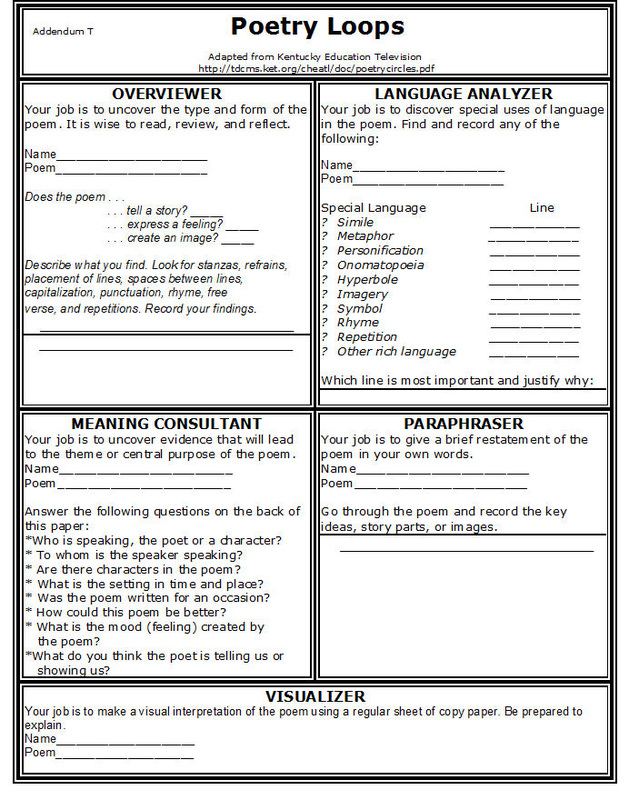2. POETRY LOOPS (Reading, Collaboration, Discussion)
Description: Poetry Loops are role-specific groupings in which students are assigned an element of poetry to examine individually and then share within a group.
Application: This format is used when students are analyzing poems for context and meaning.
Process: Collect four or five poems and allow students to choose which poem they would like to examine, a different poem each week for three weeks. Instruct students to read their chosen poem silently three times. After a predetermined amount of time, ask students to write a brief reflection on how the poem made them think and feel. Next, place students in a group based on their selection, maximum five students per group. Allow students to decide which role they would like to assume, but each student must have a unique role. Hand out Poetry Circle Role Sheet (Addendum T):
Overviewer: uncovers the type and form of the poem.
Paraphraser: gives a brief restatement of the poem in the student’s own words.
Language Analyzer: discovers special uses of language in the poem.
Meaning Consultant: reveals clues to help students understand the poem.
Visualizer: draws pictures to illustrate the poem.
Once students have completed their Role Sheet, tell them to share their answers within their group. Repeat for three weeks. Optional: on the fourth week, ask students to return to the poem that had the greatest meaning to them personally and share with each other, using the format given.
Description: Poetry Loops are role-specific groupings in which students are assigned an element of poetry to examine individually and then share within a group.
Application: This format is used when students are analyzing poems for context and meaning.
Process: Collect four or five poems and allow students to choose which poem they would like to examine, a different poem each week for three weeks. Instruct students to read their chosen poem silently three times. After a predetermined amount of time, ask students to write a brief reflection on how the poem made them think and feel. Next, place students in a group based on their selection, maximum five students per group. Allow students to decide which role they would like to assume, but each student must have a unique role. Hand out Poetry Circle Role Sheet (Addendum T):
Overviewer: uncovers the type and form of the poem.
Paraphraser: gives a brief restatement of the poem in the student’s own words.
Language Analyzer: discovers special uses of language in the poem.
Meaning Consultant: reveals clues to help students understand the poem.
Visualizer: draws pictures to illustrate the poem.
Once students have completed their Role Sheet, tell them to share their answers within their group. Repeat for three weeks. Optional: on the fourth week, ask students to return to the poem that had the greatest meaning to them personally and share with each other, using the format given.
Reference, image and/or for more information:
2. Poetry Loops
http://tdcms.ket.org/cheatl/doc/poetrycircles.pdf
2. Poetry Loops
http://tdcms.ket.org/cheatl/doc/poetrycircles.pdf

